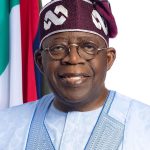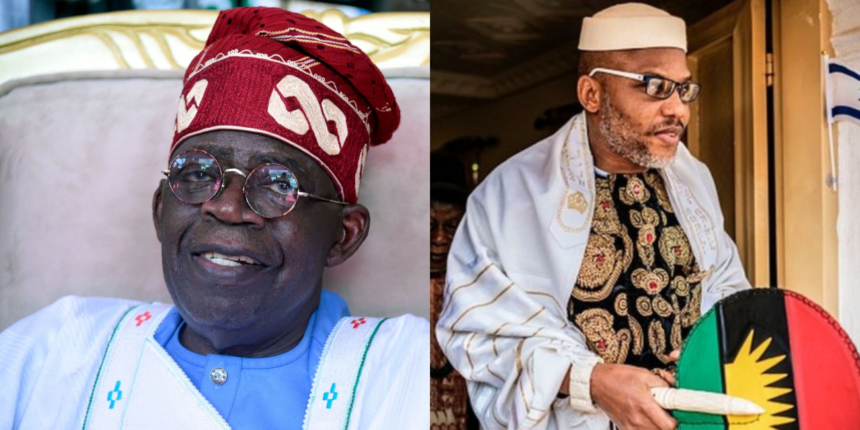Nnamdi Kanu, the detained leader of the Indigenous People of Biafra (IPOB) would have regained his freedom but for Imo State politics and the forthcoming governorship election in the state, The View News can exclusively report.
Kanu, the leader of the separatist group was on June 19, 2021, abducted from Nairobi airport in Kenya and then detained and tortured for about 10 days in Kenya.
Under Muhammadu Buhari’s administration, Kanu was subsequently flown by private plane from Kenya to Nigeria later in June 2021.
Since Kanu was brought to Nigeria to face trial for terrorism charges, he has been detained in solitary confinement at the headquarters of the Department of State Services, Nigeria’s secret police, in the capital city, Abuja.
Mr Kanu, a British citizen, has requested consular assistance from the British government, but the appeals failed.
However, sources in the Presidency told The View News on Friday that President Bola Tinubu would have ordered the release of Kanu but he was advised against doing so at this time by some politicians close to him.
The View News learnt that Tinubu was advised to hold on till after Imo State governorship election scheduled for November 11, 2023, as Kanu’s release before then could have political implications in the Southeast region.
“The release of Nnamdi Kanu was stalled by the Southeast politics of Imo. They claimed to Tinubu that his release might affect the election in Imo so the President waited,” one of the sources told The View News.
On Sunday, another separatist leader Sunday Adeyemo, popularly known as Sunday Igboho, who was in Cotonou, Republic of Benin capital, said that he was now legally free to return to Nigeria, after two years.
Igboho, who has since left the Republic of Benin to see his family in Germany, disclosed that he was now free to return to Nigeria and visit any country in the world.
The Yoruba Nation agitator said he had “fulfilled all the legal conditions attached to my bail few years back and I am coming home to Nigeria, my country of origin, any moment from now”.
Igboho was arrested on July 20, 2021, at Cardinal Bernardin International Airport in Cotonou, while trying to travel to Germany three weeks after he was declared wanted by Nigeria secret police, the Department of State Services (DSS).
Nigerian government made efforts to have Igboho expedited to Nigeria from the Republic of Benin like it was done in Kanu’s case but failed.
He was later granted bail by a Benin Republic court and was allowed to remain in Cotonou.
Igboho commended some prominent Yoruba indigenes, politicians, the media, academia and monarchs for the support he enjoyed in Cotonou.
It was earlier reported that the Court of Appeal in October 2022 discharged Kanu of the counts filed against him. The appellate court subsequently barred any further arrest, detention and trial of Kanu by the agents of the government.
The Nigerian government later appealed against the judgement at the Supreme Court and subsequently got another panel of the Court of Appeal to stay the judgement of the appellate court.
Despite the judgements in favour of Kanu, he has remained in solitary confinement at the facility of the DSS.
On Tuesday, Kanu, through one of his lawyers, Aloy Ejimakor, said the Court of Appeal should not consider adjourning the hearing on IPOB’s appeal challenging its proscription as a terrorist organisation by the Nigerian government.
The Abuja Division of the Court of Appeal in March fixed October 16 to hear the appeal filed by IPOB to challenge its proscription as a terrorist organisation.
The Nigerian government under former President Muhammadu Buhari proscribed IPOB over its alleged killings and other atrocities in its agitation for the actualisation of the Biafra Nation.
On January 18, 2018, a Federal High Court sitting in Abuja held that the proscription of IPOB by former President Buhari’s government was in order.
Justice Abdul Abdu-Kafarati of the Federal High Court proscribed IPOB based on the ex parte motion filed by the then Attorney General of the Federation and Minister of Justice, Abubakar Malami (SAN), on behalf of the Nigerian government, specifically declaring as illegal, all IPOB’s activities, particularly in the Southeast and South-South regions of Nigeria.
But the group approached the Court of Appeal insisting that the trial court erred in law. It pleaded with the court to set aside the order of the lower court and the motion ex parte.
IPOB in its five grounds of appeal contended that Justice Abdu-Kafarati erred in law and occasioned a miscarriage of justice, when he ruled that the mandatory statutory condition requiring Buhari’s approval, under Section 2 (1) (C) of the Terrorism (Prevention) (Amendment) Act, 2013, was satisfied, on the authority of a Memo the AGF issued on September 15, 2017.






